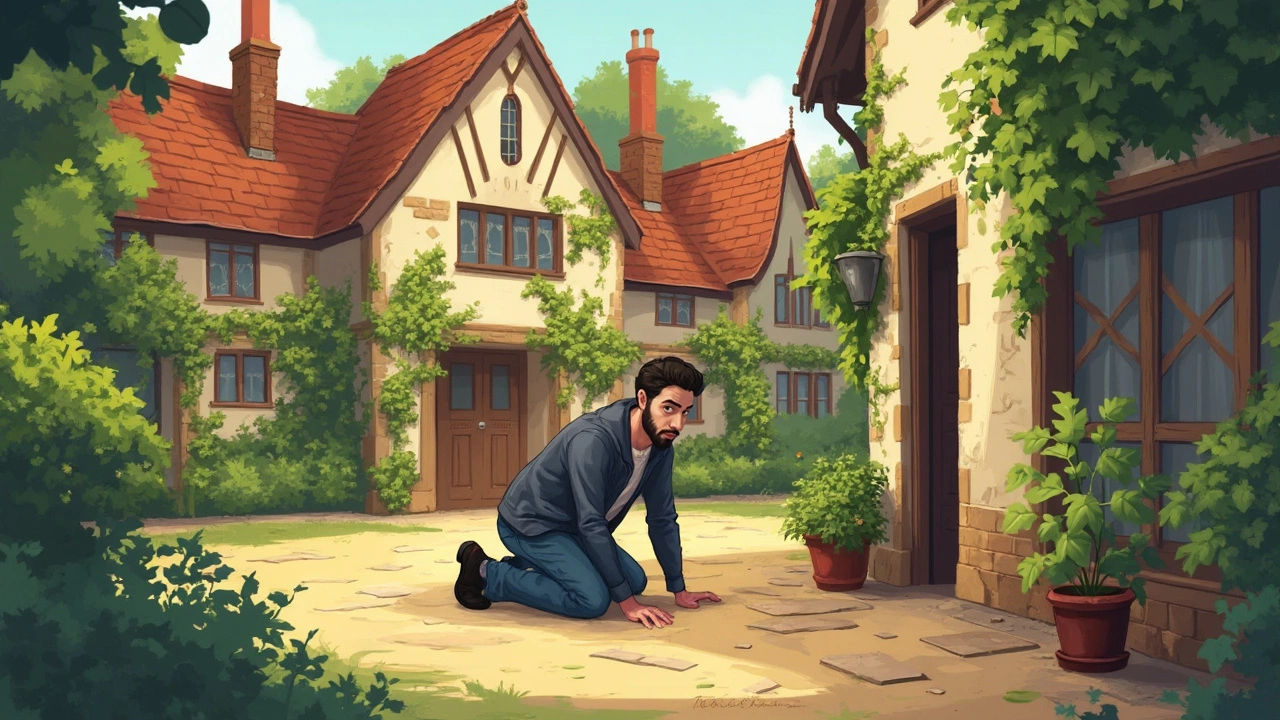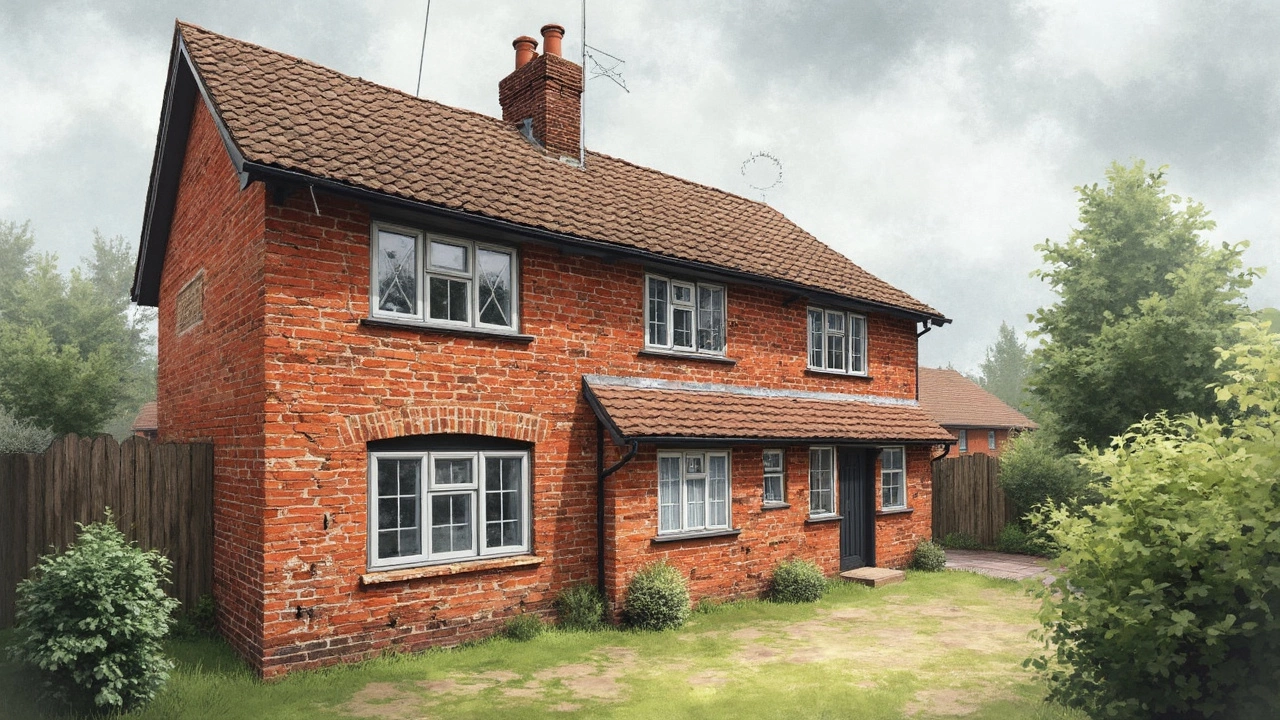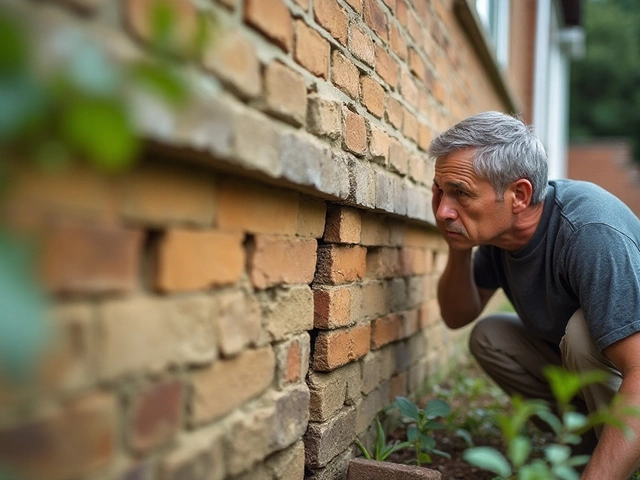So, you're sitting on your couch and suddenly wonder if your home could just... crumble one day because of foundation issues. Sounds like a nightmare, right? But hey, let's cool off those panicky thoughts for a moment. It's not like the walls will just give up on you without any warning signs. Foundations can be sneaky, but not invisible. If tackled in time, foundation problems can definitely be managed without creeping into your dreams.
First, let's talk about what's really going on down there. Your home's foundation acts like its backbone. Shifts in soil, water leaks, or tree roots can mess with it, kind of like having a bad back. Ignoring these issues is asking for trouble because, yeah, eventually they can lead to walls cracking or doors sticking. In extreme cases, yes, a collapse can happen. But the key is to catch those signs early.
Notice any cracks running along your walls, or maybe the floors suddenly seem not-so-level? These are like little warning nudges. They're not saying 'panic,' but more like 'get me checked out!' Understandably, you might not be well-versed in detecting these problems yourself, but recognizing these signs could save your home — and a lot of cash — from potential disasters.
- Understanding Foundation Issues
- Warning Signs of Potential Collapse
- Causes Behind Foundation Problems
- Preventive Measures for Homeowners
- When to Call in the Pros
Understanding Foundation Issues
Alright, let's get to the heart of what's happening with your home’s foundation. Imagine it like your house's best friend, holding everything together, literally. A solid foundation keeps everything straight and level. But when things go haywire, trouble's just around the corner. So, what causes these foundation issues?
First up, shifting soil. Different soils act differently, and they can expand or contract depending on how much water they're holding. If you live in a place with clay soil, it’s like having a sponge under your home. Too much rain, and it swells. A dry spell? It shrinks.
Then there’s water. Yep, the same precious liquid we need to live can be a home's enemy underground. Poor drainage and plumbing leaks contribute to this mess, washing away the soil around your foundation and causing it to sink or shift.
And don’t underestimate those sneaky tree roots. They’re out there searching for water, and in the process, they can start pushing against your foundation. It's like a slow-motion battle happening beneath your floorboards.
How can you tell if something's up? Let’s break it down:
- Cracks in walls or floors? They might be trying to tell you something.
- Do doors refuse to close smoothly? They're hinting at foundation issues too.
- Seen any gaps appearing around window frames? That's definitely worth a peek.
Know that being aware of these signs can keep you on top of things and prevent more serious problems from stepping in.
Warning Signs of Potential Collapse
You know how when your car makes a weird noise, you don't ignore it? You peek under the hood. Well, your house does something similar before it decides to throw in the towel. Spotting foundation issues early is kind of like catching a car problem before you end up stuck on the side of the road. It’s about listening to your home's 'noises,' and by noises, I mean visible signs you shouldn't brush off.
First off, let's talk about cracks. Keep an eye out for any appearing on the walls, especially if they start snaking their way out from doors or windows. We're not just talking about those tiny hairline lines; we're talking gaps that catch your attention. Vertical or diagonal cracks can be early signals something's up.
Next, are your doors or windows suddenly misbehaving? Like, you'd think your house is playing a prank on you, refusing to open smoothly. This could mean the foundation is taking sides — literally.
Floors that feel more like waves instead of a flat surface might look cool, but they’re not. Sloping or bouncing floors are red flags waving for your attention. They often mean your foundation is settling in ways it shouldn’t.
Also, if you notice gaps forming between the walls and ceiling or floors, that’s like your home throwing up its hands in frustration. This isn’t usually a sign that can be shrugged off.
Water can also do a number. Check the basement or crawl spaces for excessive moisture, which might hint at poor drainage or leaks affecting the foundation. Regular puddles or dampness are not your home's way of staying hydrated; it’s a signal for help.
Here's a handy rundown:
- Cracks in walls, especially around doors/windows.
- Doors/windows not aligning or sticking.
- Uneven or bouncy floors.
- Gaps between walls and floor/ceilings.
- Excessive moisture or water pooling near the foundation.
Listen to these signs. They’re not whispers of doom, but rather a call to action. Addressing these warnings sooner rather than later can save you a whole lot of headache (and cash). If you spot any of these, it might be time to give a pro a call.

Causes Behind Foundation Problems
Alright, let's dig into what really messes with a house's foundation. Think of your foundation as a big, sturdy pie that holds everything together. When some ingredients are off, you notice. It's the same with foundations.
One major culprit behind foundation issues is soil. Yep, dirt might seem harmless, but it's a serious player here. Expansive clay soils, for example, soak up water like a sponge and swell; when they dry, they shrink. It's this cycle that causes foundations to shift and crack. Kind of like that annoying friend who can't make up their mind.
Water is another usual suspect. Whether it's from relentless rain or a misbehaving plumbing system, excess water around your home isn’t your foundation’s friend. It can lead to erosion or create hydrostatic pressure against your foundation walls, pushing them inwards over time.
Then you've got those sneaky tree roots. Trees are beautiful, but their roots can be hungry, thirsty creatures. They search for water, sometimes finding it under your foundation, which can cause displacement.
But wait, there’s more. Poor construction practices can also sow the seeds of future foundation repair. If a home builder slacked on compacting the soil properly or skimped on materials, those cut corners could mean trouble down the line.
Let’s not forget natural disasters. Earthquakes, floods, or even prolonged droughts can stress a foundation enough to cause cracks or uneven settling.
Understanding what's beneath your home and what's happening around it can really make a difference. We bet this isn’t the kind of stuff you think about daily, but knowing these threats exists means you're halfway to solving them if they ever pop up.
Preventive Measures for Homeowners
Alright, let's roll up our sleeves and chat about how you can keep your home standing strong by giving your foundation the TLC it needs. Sometimes, the best defense is a good offense, right?
Regular checks around your home can be a game-changer. Start with the basics: walk around and look for any new cracks in walls or floors. If something looks suspect, it's always good to snap a pic and measure it—monitoring if it grows is key.
Next up, keep water away from the foundation. This one’s big. Ensure that your gutters are clean and directing water away from the house. A clogged gutter is like inviting water to have a puddle party right where you don't want it. If your yard tends to flood, consider grading the landscape to slope away from your house. It's not glamorous, but it works!
Notice trees getting cozy near your home's foundation? They might look nice, but their roots can be troublemakers. Maintain a healthy distance by trimming them regularly or, if they're too close, think about replacing them with less invasive plants.
- Conduct a yearly inspection of your crawl space or basement.
- Be mindful of any persistent damp smells or spots that won't dry out. Addressing moisture is crucial.
- Keep an eye on your water bill. A sudden spike might mean a leak, which is just bad news for the foundation.
Want to go a step further? Investing in a moisture barrier or sealant can provide extra protection. Talk to a foundation repair specialist about the best options for your climate and soil type. Sometimes a bit of upfront effort can save you loads of stress and cash down the road.
Remember, the goal here isn't just to spot issues but ideally to prevent them. Keep your home safe and standing proud by making these practices part of your routine. Your future self will thank you!

When to Call in the Pros
Alright, so you've spotted some suspicious signs hinting at potential foundation issues. Knowing when to reach out for professional help is crucial — don't wait until your home feels like it's auditioning for a disaster movie.
If you notice any cracks wider than a quarter inch on your walls or floors, that's your first cue. These kinds of cracks can suggest significant shifts in the foundation. Also, if you spot them zigzagging across multiple bricks or extending from one wall to another, it's definitely time to call in the experts.
Another red flag waving at you might be sticking doors and windows. Sure, sometimes the house just settles with age, but it could be the start of something more serious. If you're putting more muscle into opening that door than you do at the gym, get someone to take a look!
Have you found your basement pooling water? That damp, musty smell isn’t just unpleasant — it’s a sign water is messing with your foundation. Persistent moisture is not just inviting mold; it's also eroding soil around your foundation. Bad news, right?
If this sounds familiar, professional help is a call away. A foundation specialist or a structural engineer can tell you exactly what's going on with your home. They use tools and expertise that go way beyond what you'd pick up from a quick internet search. It's not about small fixes anymore; it's about ensuring your home stays safe and sound.
Oh, and here's a cool fact: homes with properly maintained foundations can actually see increased value if you ever plan to sell. A solid foundation is kind of like a good credit score for your house — buyers love it!
In essence, don't shrug off these signs. Taking action now can save a fortune later, not to mention the peace of mind knowing your beloved home won't collapse from lurking foundation problems. So, keep your eyes peeled and don't hesitate to get those pros on the scene when things start looking iffy!





